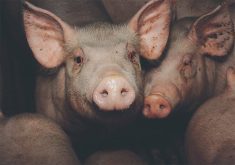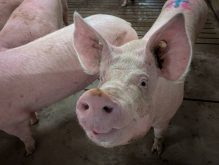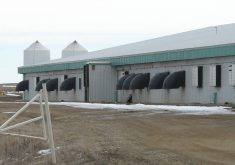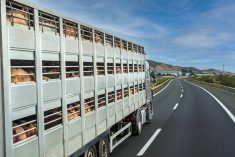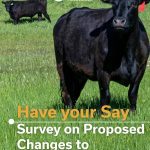Labour issues for pork producers and processors in Iowa and Minnesota are just as dire as in Manitoba, pork producers heard during their AGM on April 6.
“Currently labour is our No. 1 issue on the farm as well as in the plants,” said Kevin Rasmussen, president of the Iowa Pork Producers Association.
Rasmussen spoke alongside John Anderson, president of the Minnesota Pork Producers, during the Manitoba Pork Council’s annual general meeting in Winnipeg.
Why it matters: The pork industry is highly integrated in North America, making for many shared issues between the two countries.
Read Also

Farm trade policy pundits lay CUSMA odds
What’s the future of Canada’s free trade agreement with the U.S. and Mexico? Policy experts try to read the stars on the issue
Manitoba Pork members took the chance to ask Rasmussen and Anderson about conditions across the border.
Asked what solutions might put more workers or artificial intelligence in barns, Anderson said he couldn’t see AI taking over.
“It takes a compassionate person to take care of Day 1 pig care, and I can’t see when that’s ever going to change,” he said.
“If our politicians would ever get their act together and make a road to citizenship from the southern border, I don’t know if our labour issues would go away but they would be a lot easier,” Anderson said.
When pork producers go to Washington, “it’s the same old dog and pony show,” he added.
Farmers are competing against everyone else for workers, Anderson said. A manufacturer in his town, west of Minneapolis, has posted a $20-per-hour starting wage so they have to match that, he said.
Rasmussen said a new processing plant near his home in Humboldt County in northern Iowa isn’t yet fully staffed. It started out offering workers $12.50 per hour and is now offering about $18 per hour plus a signing bonus.
American packers are sending hams to Mexican processors to be deboned and sent back, Rasmussen said. Workers there are paid about $20 per day.
A recent Manitoba Pork labour survey, which general manager Cam Dahl said skewed somewhat toward independent operators, showed producers were having trouble recruiting for all positions.
The survey showed producers think foreign labour is necessary, but the related programs are too slow, Dahl said.

Recently announced changes to the Temporary Foreign Worker (TFW) Program are positive, “but we have a long ways to go,” Dahl added.
On April 4, the federal government announced it would drop the limit to the number of low-wage workers employers can hire through the TFW program. The maximum duration of these positions will be increased to 270 from 180 days, the government said in a news release.
Labour Market Impact Assessments will be valid for 18 months, up from nine months, and the maximum duration for High-Wage and Global Talent Streams jobs will be extended to three years from two.
Pork producers aren’t looking for TFWs, Dahl said. They’re looking for people who want to be Canadian citizens, he said, and they want that avenue to be readily available to workers.
Dahl said understaffed barns probably contributed to the 2021-22 porcine epidemic diarrhea (PED) outbreak.
“Do I have any definitive signs? No. Do I firmly believe that staff shortages make biosecurity more difficult? Yes. Is that a factor in the spread of disease? Yes, it is,” Dahl said.
ASF preparation
The American government is monitoring African swine fever through the U.S. Swine Health Improvement Plan (SHIP).
Iowa and Minnesota have a task force outside the SHIP program, Anderson said. It would be a good thing to work together with Manitoba, he added, since their industries are intertwined (Minnesota and Iowa producers buy weanlings from Manitoba).
The working group’s first priority, should an ASF case be found, is, “We’re going to try to stamp it out,” Anderson said. If that doesn’t work, they’ll look to the broader picture.
In St. Martin County, Minnesota, there’s a hog barn on every quarter section, Anderson said. To draw a five-mile circle around an outbreak encompasses a lot of pigs, he said, and it gets worse in Iowa.
“My nightmare situation is somebody finds a dead wild boar along the road and they test him, and he tests positive for a foreign animal disease,” Rasmussen said. “How do you draw a circle around that?”
They’re learning from prior outbreaks, Anderson said. They also learned from COVID-19-related packing plant closures, which led to some farmers culling pigs they couldn’t sell.
They got good at slowing pigs’ growth during those COVID-related issues, Rasmussen said.
A producer asked Rasmussen and Anderson who would be responsible for culling surplus, healthy animals that couldn’t be marketed amidst an outbreak.
“As producers, we are,” is the short answer, Anderson said. They’d get indemnity for infected pigs only.
“I would rather say those decisions have not been made,” Rasmussen said.
He said he hoped there would be a national action to compensate producers so some don’t feel they need to infect healthy pigs to recoup their costs.
Producers who had to depopulate barns during COVID-related plant closures were compensated for expenses related to culling, e.g. hauling pigs to a rendering plant, Anderson said.
Rasmussen and Anderson said to their knowledge no farmers were reimbursed for animals that had to be killed.
Manitoba producers also questioned Rasmussen and Anderson about Proposition 12, a California animal care initiative that recently came into effect.
Proposition 12 revised California law to add more stringent requirements for “freedom of movement, cage-free design and minimum floor space” for breeding hogs, laying hens and veal calves, according to the California Department of Food and Agriculture’s website.
It also prohibits the sale of meat from animals housed “in a cruel manner,” the site says.
Anderson said animal rights advocates targeted California because it imports most of its own pork.
California is “seeking to regulate how farmers across the country operate,” the National Pork Producers Council said in a statement on its website.
Dahl asked if Manitoba farmers who sell isoweans to American farmers would also need to be compliant with Proposition 12.
Anderson said the rules haven’t been finalized.




